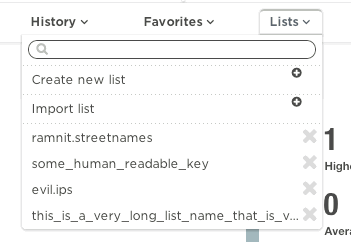是否可以在占位符中使用 Font Awesome 图标?我读到占位符中不允许使用 HTML。有解决方法吗?
placeholder="<i class='icon-search'></i>"
是否可以在占位符中使用 Font Awesome 图标?我读到占位符中不允许使用 HTML。有解决方法吗?
placeholder="<i class='icon-search'></i>"
如果您使用FontAwesome 4.7它应该足够了:
<link href="https://cdnjs.cloudflare.com/ajax/libs/font-awesome/4.7.0/css/font-awesome.min.css" rel="stylesheet"/>
<input type="text" placeholder=" Search" style="font-family:Arial, FontAwesome" />十六进制代码列表可以在Font Awesome 备忘单中找到。但是,在最新的 FontAwesome 5.0 中,此方法不起作用(即使您使用 CSS 方法结合更新的font-family.
您无法添加图标和文本,因为您无法将不同的字体应用于占位符的一部分,但是,如果您对仅图标感到满意,那么它可以工作。FontAwesome 图标只是具有自定义字体的字符(您可以查看规则中的转义 Unicode 字符的FontAwesome 备忘单content。在变量中找到的 less 源代码中。挑战将是在输入为不为空。像这样与 jQuery 结合使用。
<form role="form">
<div class="form-group">
<input type="text" class="form-control empty" id="iconified" placeholder=""/>
</div>
</form>
使用这个 CSS:
input.empty {
font-family: FontAwesome;
font-style: normal;
font-weight: normal;
text-decoration: inherit;
}
而这个(简单的)jQuery
$('#iconified').on('keyup', function() {
var input = $(this);
if(input.val().length === 0) {
input.addClass('empty');
} else {
input.removeClass('empty');
}
});
然而,字体之间的过渡不会是平滑的。
我用这种方法解决了:
在 CSS 中,我将此代码用于fontAwesome 类:
.fontAwesome {
font-family: 'Helvetica', FontAwesome, sans-serif;
}
在 HTML 中,我在占位符内添加了fontawesome 类和fontawesome 图标代码:
<input type="text" class="fontAwesome" name="emailAddress" placeholder=" insert email address ..." value="">
你可以在CodePen中看到。
@Elli 的答案可以在 FontAwesome 5 中使用,但它需要使用正确的字体名称并使用您想要的版本的特定 CSS。例如,当使用 FA5 Free 时,如果我包含 all.css,我无法让它工作,但如果我包含 solid.css,它就可以正常工作:
<link rel="stylesheet" href="https://use.fontawesome.com/releases/v5.8.1/css/solid.css">
<input type="text" placeholder=" Search" style="font-family: Arial, 'Font Awesome 5 Free'" />对于 FA5 Pro,字体名称为“Font Awesome 5 Pro”
在支持的情况下,您可以将::input-placeholder伪选择器与::before.
请参阅以下示例:
http://codepen.io/JonFabritius/pen/nHeJg
我只是在研究这个并遇到了这篇文章,我从中修改了这些东西:
我正在使用 Ember(版本 1.7.1),我需要绑定输入的值并有一个占位符,它是一个 FontAwesome 图标。在 Ember 中绑定值的唯一方法(据我所知)是使用内置的帮助器。但这会导致占位符被转义,“”就这样显示出来,文本。
如果您是否使用 Ember,则需要将输入占位符的 CSS 设置为具有 FontAwesome 的字体系列。这是 SCSS(使用Bourbon 作为占位符样式):
input {
width:96%;
margin:5px 2%;
padding:0 8px;
border:1px solid #444;
border-radius: 14px;
background: #fff;
@include placeholder {
font-family: 'FontAwesome', $gotham;
}
}
如果您只是使用车把,如前所述,您可以将 html 实体设置为占位符:
<input id="listFilter" placeholder="" type="text">
如果您使用 Ember 将占位符绑定到具有 unicode 值的控制器属性。
在模板中:
{{text-field
id="listFilter"
placeholder=listFilterPlaceholder
value=listFilter}}
在控制器上:
listFilter: null,
listFilterPlaceholder: "\uf002"
并且值绑定工作正常!


placeholder=""在您的输入中使用。您可以在 FontAwesome 页面http://fontawesome.io/icons/中找到 unicode 。但是您必须确保添加style="font-family: FontAwesome;"您的输入。
任何想知道Font Awesome 5实现的人:
不要指定一般的“Font Awesome 5”字体系列,您需要专门以您正在使用的图标分支结束。在这里,我使用分支“Brands”为例。
<input style="font-family:'Font Awesome 5 Brands' !important"
type="text" placeholder="">
我知道这个问题很老了。但我没有看到任何像我过去使用的简单答案。
您只需将fas类添加到输入中,并在这种情况下为 Font-Awesome 的字形添加一个有效的十六进制,如下所示<input type="text" class="fas" placeholder="" />
您可以在此处的官网上找到每个字形的 unicode 。
这是一个不需要 css 或 javascript 的简单示例。
input {
padding: 5px;
}<link rel="stylesheet" href="https://use.fontawesome.com/releases/v5.6.3/css/all.css" integrity="sha384-UHRtZLI+pbxtHCWp1t77Bi1L4ZtiqrqD80Kn4Z8NTSRyMA2Fd33n5dQ8lWUE00s/" crossorigin="anonymous">
<form role="form">
<div class="form-group">
<input type="text" class="fas" placeholder="" />
</div>
</form>我通过向fa-placeholder输入文本添加类来做到这一点:
<input type="text" name="search" class="form-control" placeholder="" />
所以,在css中添加这个:
.fa-placholder {
font-family: "FontAwesome"; }
这对我来说很有用。
更新:
要在用户输入文本时更改字体,只需在 font awesome 之后添加字体
.fa-placholder {
font-family: "FontAwesome", "Source Sans Pro"; }
忽略 jQuery,这可以使用::placeholder输入元素来完成。
<form role="form">
<div class="form-group">
<input type="text" class="form-control name" placeholder=""/>
</div>
</form>
CSS部分
input.name::placeholder{ font-family:fontAwesome; font-size:[size needed]; color:[placeholder color needed] }
input.name{ font-family:[font family you want to specify] }
最好的部分:您可以为占位符和文本使用不同的字体系列
我用不同的方式解决了这个问题,它可以通过 html 代码与任何 FA 图标一起使用。我的解决方案不是占位符的所有这些困难,而是:
HTML
<i class="fas fa-icon block__icon"></i>
<input type="text" name="name" class="block__input" placeholder="Some text">
CSS
.block__icon {
position: absolute;
margin: some-corrections;
}
.block__input {
padding: some-corrections;
}
HTML
<!-- For example add some spaces in placeholder, to make focused cursor stay before an icon -->
...placeholder=" Some text"...
CSS
.block__icon {
position: absolute;
margin: some-corrections;
/* The new line */
pointer-events: none;
}
HTML
<i class="fas fa-icon block__icon"></i>
<input type="text" name="name" class="block__input" placeholder=" Some text">
CSS
.block__icon {
position: absolute;
z-index: 2; /* New line */
margin: some-corrections;
}
.block__input {
position: relative; /* New line */
z-index: 2; /* New line */
padding: some-corrections;
}
/* New */
.block__input:placeholder-shown {
z-index: 1;
}
这比我以前想象的要难,但我希望我能帮助任何人。
代码笔: https ://codepen.io/dzakh/pen/YzKqJvy
Teocci解决方案尽可能简单,因此无需添加任何 CSS,只需为 Font Awesome 5 添加 class="fas",因为它为元素添加了正确的 CSS 字体声明。
这是 Bootstrap 导航栏中搜索框的示例,搜索图标添加到输入组和占位符(当然,为了演示,没有人会同时使用两者)。图片:https://i.imgur.com/v4kQJ77.png > 代码:
<form class="form-inline my-2 my-lg-0">
<div class="input-group mb-3">
<div class="input-group-prepend">
<span class="input-group-text"><i class="fas fa-search"></i></span>
</div>
<input type="text" class="form-control fas text-right" placeholder="" aria-label="Search string">
<div class="input-group-append">
<button class="btn btn-success input-group-text bg-success text-white border-0">Search</button>
</div>
</div>
</form>
我在占位符中同时添加了文本和图标。
placeholder="Edit "
CSS:
font-family: FontAwesome,'Merriweather Sans', sans-serif;
如果您可以/想要使用 Bootstrap,则解决方案将是输入组:
<div class="input-group">
<div class="input-group-prepend">
<span class="input-group-text"><i class="fa fa-search"></i></span>
</div>
<input type="text" class="form-control" placeholder="-">
</div>
看起来像这样:输入带有文本前置和搜索符号
There is some slight delay and jank as the font changes in the answer provided by Jason. Using the "change" event instead of "keyup" resolves this issue.
$('#iconified').on('change', function() {
var input = $(this);
if(input.val().length === 0) {
input.addClass('empty');
} else {
input.removeClass('empty');
}
});
<link rel="stylesheet" href="https://use.fontawesome.com/releases/v5.6.3/css/all.css">
<form role="form">
<div class="form-group">
<input type="text" class="form-control empty" id="iconified" placeholder="search">
<i class="fas fa-search"></i>
</div>
</form>
.form-group {
position: relative;
}
i {
position: absolute;
left: 0;
top: 50%;
transform: translateY(-50%);
z-index: 999;
}
input {
padding-left: 1rem;
}
有时最重要的答案是不醒,当您可以使用以下技巧时
.form-group {
position: relative;
}
input {
padding-left: 1rem;
}
i {
position: absolute;
left: 0;
top: 50%;
transform: translateY(-50%);
}<link rel="stylesheet" href="https://use.fontawesome.com/releases/v5.6.3/css/all.css">
<form role="form">
<div class="form-group">
<input type="text" class="form-control empty" id="iconified" placeholder="search">
<i class="fas fa-search"></i>
</div>
</form>